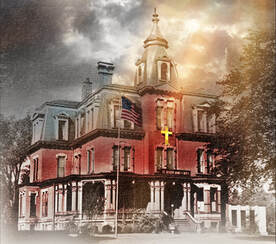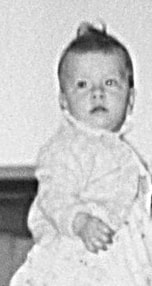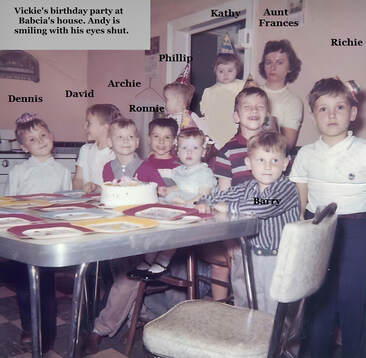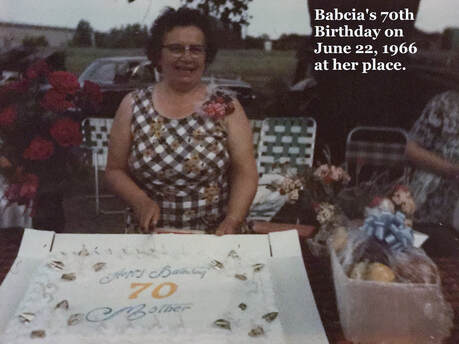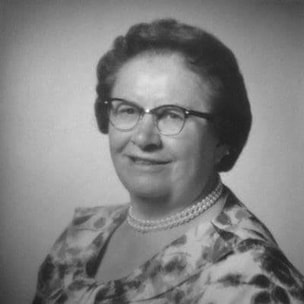The 9th Short Story
Vickie and Her Babcia
"Vickie and Her Babcia"
ANDY JUNIOR'S CHILDHOOD STORIES
The St. Joseph Home for Boys
My 9th Short Story
The St. Joseph Home for Boys stood on the northwest corner of Blackstone St. and Van Buren St. in Jackson, Michigan for more than 50 years. The Felician Sisters, out of Livonia, Michigan, purchased the mansion from a local banker in the early 1900s and cared for up to 50 boys in the orphanage, between the early 1910s and late 1960s.
For your reading pleasure, I've decided to share a story about my baby sister, Vickie, and our grandma, who we referred to in the Polish translation as Babcia. This is one of the chapters that never made it into "Andy and the St. Joseph Home for Boys" due to a technicality.
Trouble is, I couldn't use it in my book because it was totally out of character. I wasn't there to witness what really happened, so it couldn't have been from Andy Junior's eyes -- the point of view used throughout my orphanage story. I didn't want to get rid of it, because it has so much meaning within my sister's heart and mine. Without further ado, here is the chapter that never was.
"Vickie and Her Babcia"
“If a stern-looking woman with her hands on her hips tells you to do something, you better do it and do it quick!”
—Andy Skrzynski
Babcia earned deep respect as a caretaker and one of the most well-meaning women in the world. When my grandmother spoke, you listened. You didn’t ask questions, you just did exactly as you were told.
While Archie and I were hopping to the numerous demands dished out by the nuns of the St. Joseph Home for Boys, our baby sister lived under the loving care of our dad’s mother. More than a dozen Felician nuns may have been telling me and Archie what to do, but Vickie’s existence wasn’t much easier.
Her new boss migrated from Poland in the early 1900s and didn’t mess around when mothering kids. You see, she had LOTS of practice raising 10 children of her own during the onset and aftermath of the Great Depression.
Vickie’s temporary abode sat on a triangular plot along Liberty Street, where it dead-ended into S. Elm Avenue, just east of a massive railroad exchange in Jackson, Michigan. Many from around the neighborhood referred to the surrounding area, south of Page Ave and between Elm and the Grand River, as Frogtown, a haven for green, spotted croakers often hunted for their tasty legs.
Babcia’s dark-russet, two-story house, with a coal-burning furnace, provided my baby sister the shelter and proper learning environment for raising a child in traditional Polish fashion. No ifs, ands, or buts were tolerated.
Aunts and uncles, raised under our grandmother’s strong rule, frequently paraded in and out of her welcoming home to help their mother anyway they could. While Babcia possessed the perfect demeanor befitting any of the stern Polish nuns I faced in the orphanage, she loved Vickie dearly, like a hen cuddling a chick under her wing.
With her home-away-from-home surrounded by railroad tracks on three sides, Vickie’s nights offered little rest. Never-ending trains shook the whole house, including her bed, every hour of every day.
The roar of the huge engines left you certain one of them things would come plowing through the walls at any moment. A couple of years passed before she finally ignored the dreaded racket enough to sleep through to the morning, until the aroma of Babcia’s cooking tantalized her nostrils.
When Vickie reached an age where she began exploring the world around her, the trains provided entertainment of sorts. Every day, the long line of brown and green squarish things with shiny, steel wheels would slow to a stop on the tracks, behind Babcia’s house. As soon as the ear-piercing screeches of the brakes grew silent, the doors of the box cars flew open, and hordes of strangers hopped off the train and immediately hid in the tall weeds.
Several minutes passed before a loud clang rang out, and the train slowly lurched forward. Those who had been hiding, mostly men, popped to their feet and ran along the tracks, until they jumped back onto the train and disappeared inside. The same odd behavior repeated itself every morning and afternoon.
After telling Babcia what she had seen, Vickie learned that they were hobos hiding for fear of being caught and hauled away for using the railroad to travel, during their hunt for new jobs. On one particular morning, before the train normally arrived, one of our aunts stopped by to cut and dye Babcia’s hair the licorice-black color she always preferred.
Vickie couldn’t understand why her grandmother wanted to color her beautiful white hair, but while such activities were underway, my six-year-old sister played outside by herself. On this particular summer day, boredom set in and the curiosity bug bit her hard. She eventually gave in to the adventurous side of her spunky nature, overwhelming her better judgment.
She had no idea whether these scruffy vagabonds, wearing tattered clothes, would harm her or not, but that didn’t worry her. Vickie wanted to chat with them — find out why they were hiding. Maybe, they’d like to include her in their little game of hide-and-seek?
Tentatively wading through the chest-high grass, she finally found a group of the unusual visitors. After talking for a little while, they seemed more inclined to tell stories. Just as the hobos’ tales grew more interesting, their faces turned white as ghosts, while staring at something behind her.
Vickie thought they were trying to fool her. Thinking it best to play along, she whirled and found Babcia charging in her direction in the same fashion a mama grizzly rushes to protect an endangered cub. Only my sister didn’t know who our grandmother was after — the vagabonds or her.
Our aunt yelled from afar, “Vickie, hurry! Come home now!”
Frightened, but not sure why, Vickie spun back around for support, only to find her newfound friends had scattered. Gulping, she waited for Babcia, decked in curlers all wrapped up in a colorful babushka, flapping in the wind. Fear clutched her soul as she almost peed her panties.
She’d never seen such a scrunched look of horror on her grandmother’s normally puffy, round face. Practically running, the determined woman arrived within a flash and grabbed Vickie’s arm. The strong grip swung her around as the stout caretaker whacked her butt hard.
Babcia relentlessly whupped my sister all the way back to the house while yelling, “they could have stolen you!” The spanking and hollering continued until they got inside, where she added a few more whacks for good measure.
Needless to say, Vickie never wandered near those tracks or the hobos again, but her adventure didn’t really end there. Every time she spotted the choo choo, thundering by the house, she’d race her blue, bouncy pony to catch up and hear some more stories. Of course, the wooden, spring-ladened horsey didn’t go anywhere and couldn’t possibly keep pace with my sister’s wild imagination!
************
That's it for now.
Don't forget to read the captions of the photographs. These pictures include little stories of their own.
Despite the strict discipline of our Polish grandmother, her treatment was well-meaning and in the spirit of deep love. My baby sister and Babcia were so close, that later in life, when Vickie was asked to write a paper about her hero, she devoted her wonderful praise to Babcia -- her hero forever!
So you don't get the wrong impression, when I had the opportunity to reflect back on my childhood, years after I had "grown up," I was very thankful for the Felician Sisters' care and the time I spent in the orphanage.
I'll share more pictures and short stories to go with the history lessons ahead. I hope you enjoyed this little peek into my life back in the late 1950s and early 1960s. In my next post, I'll be moving on to Andy Junior's childhood life right after my dad remarried, and he brought us kids back home to live in Spring Arbor, Michigan.
Thank you so much for your support!
Andy Skrzynski
ANDY JUNIOR'S CHILDHOOD STORIES
The St. Joseph Home for Boys
My 9th Short Story
The St. Joseph Home for Boys stood on the northwest corner of Blackstone St. and Van Buren St. in Jackson, Michigan for more than 50 years. The Felician Sisters, out of Livonia, Michigan, purchased the mansion from a local banker in the early 1900s and cared for up to 50 boys in the orphanage, between the early 1910s and late 1960s.
For your reading pleasure, I've decided to share a story about my baby sister, Vickie, and our grandma, who we referred to in the Polish translation as Babcia. This is one of the chapters that never made it into "Andy and the St. Joseph Home for Boys" due to a technicality.
Trouble is, I couldn't use it in my book because it was totally out of character. I wasn't there to witness what really happened, so it couldn't have been from Andy Junior's eyes -- the point of view used throughout my orphanage story. I didn't want to get rid of it, because it has so much meaning within my sister's heart and mine. Without further ado, here is the chapter that never was.
"Vickie and Her Babcia"
“If a stern-looking woman with her hands on her hips tells you to do something, you better do it and do it quick!”
—Andy Skrzynski
Babcia earned deep respect as a caretaker and one of the most well-meaning women in the world. When my grandmother spoke, you listened. You didn’t ask questions, you just did exactly as you were told.
While Archie and I were hopping to the numerous demands dished out by the nuns of the St. Joseph Home for Boys, our baby sister lived under the loving care of our dad’s mother. More than a dozen Felician nuns may have been telling me and Archie what to do, but Vickie’s existence wasn’t much easier.
Her new boss migrated from Poland in the early 1900s and didn’t mess around when mothering kids. You see, she had LOTS of practice raising 10 children of her own during the onset and aftermath of the Great Depression.
Vickie’s temporary abode sat on a triangular plot along Liberty Street, where it dead-ended into S. Elm Avenue, just east of a massive railroad exchange in Jackson, Michigan. Many from around the neighborhood referred to the surrounding area, south of Page Ave and between Elm and the Grand River, as Frogtown, a haven for green, spotted croakers often hunted for their tasty legs.
Babcia’s dark-russet, two-story house, with a coal-burning furnace, provided my baby sister the shelter and proper learning environment for raising a child in traditional Polish fashion. No ifs, ands, or buts were tolerated.
Aunts and uncles, raised under our grandmother’s strong rule, frequently paraded in and out of her welcoming home to help their mother anyway they could. While Babcia possessed the perfect demeanor befitting any of the stern Polish nuns I faced in the orphanage, she loved Vickie dearly, like a hen cuddling a chick under her wing.
With her home-away-from-home surrounded by railroad tracks on three sides, Vickie’s nights offered little rest. Never-ending trains shook the whole house, including her bed, every hour of every day.
The roar of the huge engines left you certain one of them things would come plowing through the walls at any moment. A couple of years passed before she finally ignored the dreaded racket enough to sleep through to the morning, until the aroma of Babcia’s cooking tantalized her nostrils.
When Vickie reached an age where she began exploring the world around her, the trains provided entertainment of sorts. Every day, the long line of brown and green squarish things with shiny, steel wheels would slow to a stop on the tracks, behind Babcia’s house. As soon as the ear-piercing screeches of the brakes grew silent, the doors of the box cars flew open, and hordes of strangers hopped off the train and immediately hid in the tall weeds.
Several minutes passed before a loud clang rang out, and the train slowly lurched forward. Those who had been hiding, mostly men, popped to their feet and ran along the tracks, until they jumped back onto the train and disappeared inside. The same odd behavior repeated itself every morning and afternoon.
After telling Babcia what she had seen, Vickie learned that they were hobos hiding for fear of being caught and hauled away for using the railroad to travel, during their hunt for new jobs. On one particular morning, before the train normally arrived, one of our aunts stopped by to cut and dye Babcia’s hair the licorice-black color she always preferred.
Vickie couldn’t understand why her grandmother wanted to color her beautiful white hair, but while such activities were underway, my six-year-old sister played outside by herself. On this particular summer day, boredom set in and the curiosity bug bit her hard. She eventually gave in to the adventurous side of her spunky nature, overwhelming her better judgment.
She had no idea whether these scruffy vagabonds, wearing tattered clothes, would harm her or not, but that didn’t worry her. Vickie wanted to chat with them — find out why they were hiding. Maybe, they’d like to include her in their little game of hide-and-seek?
Tentatively wading through the chest-high grass, she finally found a group of the unusual visitors. After talking for a little while, they seemed more inclined to tell stories. Just as the hobos’ tales grew more interesting, their faces turned white as ghosts, while staring at something behind her.
Vickie thought they were trying to fool her. Thinking it best to play along, she whirled and found Babcia charging in her direction in the same fashion a mama grizzly rushes to protect an endangered cub. Only my sister didn’t know who our grandmother was after — the vagabonds or her.
Our aunt yelled from afar, “Vickie, hurry! Come home now!”
Frightened, but not sure why, Vickie spun back around for support, only to find her newfound friends had scattered. Gulping, she waited for Babcia, decked in curlers all wrapped up in a colorful babushka, flapping in the wind. Fear clutched her soul as she almost peed her panties.
She’d never seen such a scrunched look of horror on her grandmother’s normally puffy, round face. Practically running, the determined woman arrived within a flash and grabbed Vickie’s arm. The strong grip swung her around as the stout caretaker whacked her butt hard.
Babcia relentlessly whupped my sister all the way back to the house while yelling, “they could have stolen you!” The spanking and hollering continued until they got inside, where she added a few more whacks for good measure.
Needless to say, Vickie never wandered near those tracks or the hobos again, but her adventure didn’t really end there. Every time she spotted the choo choo, thundering by the house, she’d race her blue, bouncy pony to catch up and hear some more stories. Of course, the wooden, spring-ladened horsey didn’t go anywhere and couldn’t possibly keep pace with my sister’s wild imagination!
************
That's it for now.
Don't forget to read the captions of the photographs. These pictures include little stories of their own.
Despite the strict discipline of our Polish grandmother, her treatment was well-meaning and in the spirit of deep love. My baby sister and Babcia were so close, that later in life, when Vickie was asked to write a paper about her hero, she devoted her wonderful praise to Babcia -- her hero forever!
So you don't get the wrong impression, when I had the opportunity to reflect back on my childhood, years after I had "grown up," I was very thankful for the Felician Sisters' care and the time I spent in the orphanage.
I'll share more pictures and short stories to go with the history lessons ahead. I hope you enjoyed this little peek into my life back in the late 1950s and early 1960s. In my next post, I'll be moving on to Andy Junior's childhood life right after my dad remarried, and he brought us kids back home to live in Spring Arbor, Michigan.
Thank you so much for your support!
Andy Skrzynski
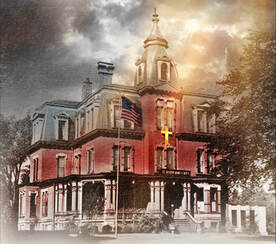
The St. Joseph Home for Boys orphanage stood on 11 acres at the northwest corner, where Blackstone St. and Van Buren St. intersected in Jackson, Michigan. Our residence room, while going to St. John's, was behind the windows of the 2nd floor to the far right above the bay windows in this picture. The dormitories, where I had my nightmares and was quarantined during my chickenpox, were located on the 3rd Floor, where you can see the cross in the front of the building.
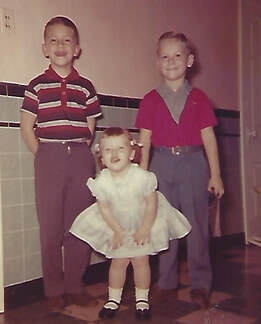
Andy Junior, in the striped shirt, with Little Brother and Baby Sister, cute as ever, in the kitchen of our grandmother's house. This was around the time my brother and I had been in the St. Joseph Home for Boys orphanage for a couple of years. If you look closely at me, in the striped shirt, you can see the gap left from all those teeth being pulled. Unfortunately, since I didn't have any baby teeth left to help guide my adult teeth, they grew in crooked. I was NEVER going to have one of those Hollywood smiles!!!
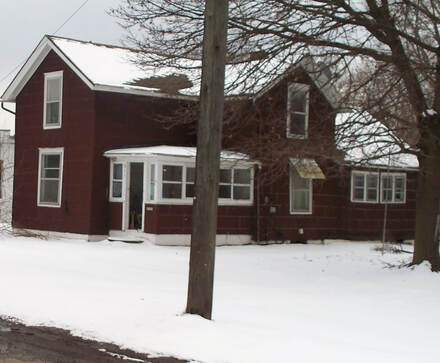
Babcia's house on Liberty St. in Jackson, Michigan, where she raised her 10 children. When her and her husband first bought the house, it included a gas station. They removed the gas pumps, and a few of her boys used the garage for mechanic work and welding. Babcia (Polish for Grandma) and Dziadzia (Polish for Grandpa) turned the porch and living room into a store, during the depression. Many a customer could not afford all the goods their family needed and Babcia and Dziadzia would let part of the payment slide. Many trusted neighbors came back and paid their differences when they could, years later. Some never could afford to, but the Skrzynski's never worried about that. They were loved by many who appreciated the treatment that other stores never offered.
